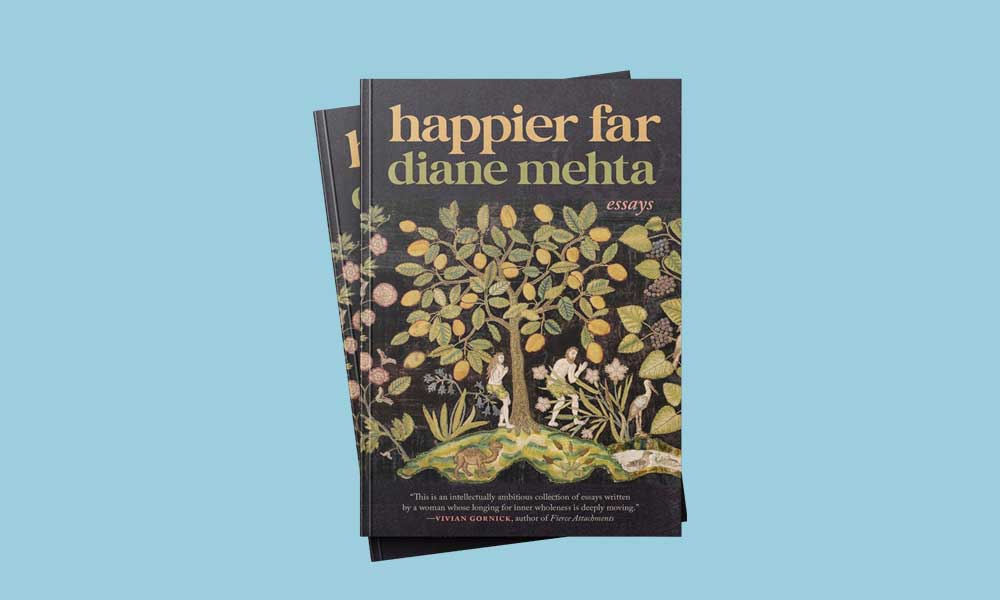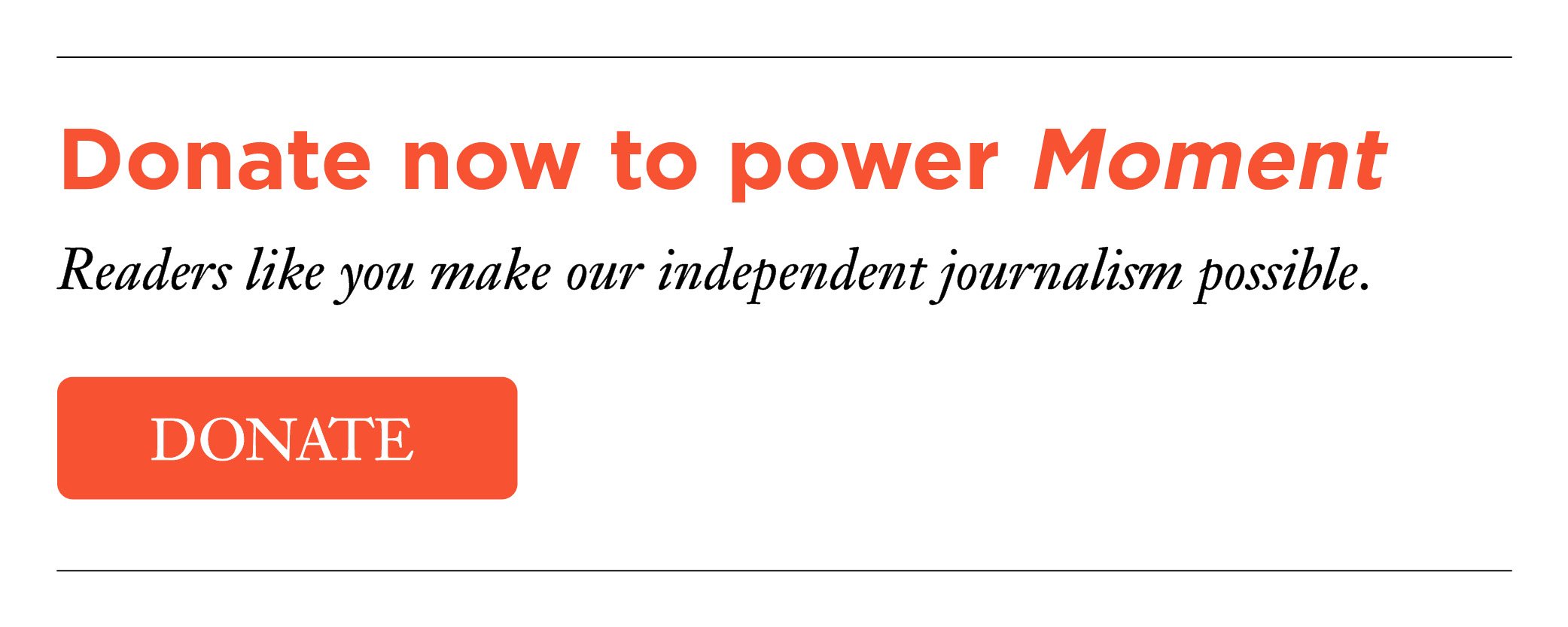
Happier Far: Essays
By Diane Mehta
University of Georgia Press. 158 pp.
Children of mixed ethnicity and geographical roots often grow up mixed up about their identity. Should they tilt toward one parent’s tradition or the other? Is it possible to find a workable balance? How should one check boxes that ask one to pigeonhole oneself?
When Zohran Mamdani, the Democratic nominee for New York City mayor, sought to defend himself for checking the “African American” box on a college application to Columbia—Mamdani was born in Uganda to an Indian Hindu mother and Indian Muslim father—it was a reminder of the ambiguities that mark blended ethnic and geographic categories.
Perhaps the challenge less thought about is how parents may come to symbolize their ethnicities and traditions to children in ways that are out of all proportion. To a child, a parent can become a walking, talking generalization about larger ethnic characteristics even if logic and later experience suggest that reality is more nuanced.
The child of a secular Ashkenazi Jewish-American mother and a Jain Indian father, poet Diane Mehta was born in 1966 in Frankfurt, Germany. She lived until age 7 in Mumbai, then moved with her parents and sister to the small Catholic town of New Providence in New Jersey and later to the Connecticut coast before going off to college. Happier Far, officially described as an essay collection, reads more like a traditional memoir. Its essays, portions of which have appeared in various literary journals, amount to chapters in Mehta’s psychological self-examination of how her very different parents impacted her.
Dilip Mehta, her still-living physician father now in his 90s, worked as a celebrated pharmaceutical scientist and executive, a star at developing drugs. He’s suffered multiple strokes in his later years, but still mumbles the Navkar Mantra, a fundamental Jain chant that pays respect to others.
Carole Leonard, her deceased mother, “a surly Brooklyn Jewish intellectual,” came from emigres to the United States generations ago from Minsk, Poland and London, her maiden name “airbrushed” in America from Levine to Leonard “to cloak the family’s Jewish identity.” A teacher and lover of classical music, “she liked prune hamantaschen, white eyelet blouses, cottage cheese, Jim Lehrer, and drawing trees and naked women sitting on the corner of a bed.”
“Here was the love machinery of a mixed-race union of East and West,” Mehta declares. “They had no idea what they were getting into.” Indeed, she senses “in my bassinet” that “my parents will not be happy.” And that is her ultimate harsh judgment.
The upshot for the author has been a lifelong search for those elements of Jewish and Indian tradition she can embrace, and a fierce determination to reject the aspects she can’t. The primal force of the book is Mehta’s overwhelming sense of the unhappiness of her parents’ marriage—an unhappiness she sees as fed by her mother’s unrealized potential—and of her own unhappiness within its orbit.
The most intriguing feature of Mehta’s take on her family history is what seem to be her embedded generalizations about what a Jewish mother and an Indian father should be. Mehta repeatedly characterizes her mother’s life as a failure because she did not become an artist like the author. She sees her father, a renowned pharmaceutical scientist, as a success because he succeeded in the Indian-American way—as a scientific and professional achiever.
Happier Far largely focuses on the three: Mehta herself, her father and her mother. Mehta’s older sister is never named or described, simply mentioned in recalling events and activities that involved “my sister and I.” Her divorced husband, present partner and son do get named and offered considerably more airtime, but very much as they orbit her rather than as independent personalities.
Both of Mehta’s family traditions impacted her strongly without either side controlling her. “India shaped my sense of myself,” she writes, recalling performing the Kumbh ritual of circling a house to ensure peacefulness, and listening to her father’s chanting. But she resists intellectual and religious commitment, noting, “I have no attachment to Jainism.”
After the move to New Jersey, the balance shifts, but she remains instinctively secular. “My mother told me I was Jewish,” she remembers, “and instructed me that from then on I would attend Sunday school at Temple Sinai in Summit, one town over. Perplexed and irritated that I had to give up a weekend morning, I complied and got myself a minimalist Jewish education, ignoring the teachings about history and God.”
The dual heritage makes her eligible for dual epithets. She’s alternately called “kike” and the n-word at school.
Out of all this comes a tough judgment on her parents’ “curdled marriage,” her mother’s experience, and her mother’s relationship to her: “What I hear in the chords of my mother’s life…is that in her forever-sadness was a life not fully lived.”
“I wonder,” Mehta muses, “at what point she swerved from a woman of intellectual exuberance into a despondent housewife who had so little…Could she have known that her children, and a handful of articles, letters, recipes, and conversations, would be the sum total of her output?” Toward the end, Mehta judges, “She hadn’t done much with her enormous talents…there was no more angling for anything deeper, she was simply living.”
The blame goes to the marriage: “The truth is that my mother crushed him with her contempt and her pathologies, and he drained her love with his indifference.”
What then to do for a poet with fierce commitment both to artistic production and to not repeating her mother’s mistakes? Of course, write a novel about it:
“I would get to the heart of their miserable marriage and what it did to me! The novel would be ugly, to show what it was like to be my mother: to be Jewish and pathologically smart, angry, overlooked, and die, in that order. I’d dramatize the story of my father, whose Jainism shaped his moral center but left him emotionally remote.” (Last year, Mehta published Leaving Malabar Hill with OR Books, teleporting a version of her parents’ marriage back to the era of the Raj.)
The real-life marriage, it seems, left the author emotionally bereft. In one of her starkest comparisons, Mehta writes, “[T]here was a difference between Indian mothers and my mother. Indian mothers cared for their children with proximity and affection. My mother cared for me with proximity and without affection.” Yet her parents stayed together for 40 years, until her mother’s death. Who knows if they’d tell a different version of their story?
Happier Far offers many purely literary pleasures: arabesques on horses, Prospect Park, poetry and Mehta’s many illnesses, festooned with sharp lines and images (“A full-blown migraine is like childbirth in your head”). Anyone engaged with Jewish or Indian culture will happily absorb the richness of everyday detail Mehta provides. As with Mehta’s poems in collections such as Forests with Castanets (2019) and Tiny Extravaganzas (2023), which lyrically engage many of the themes here, Happier Far grapples with religious belief, her passion for classical music, the challenges of motherhood and growing older, the way art promises to rescue one from everything bad in life.
Finally, however, the lasting impact of Happier Far is a pondering of that most intimate form of bringing ethnicities together—marriage and children.
Throughout history, “us vs. them” thinking has led to endless war, hatred and tragedy. At the same time, it produced, for the most part, stable insularity and peacefully homogenized identity. In the modern world of accelerated communication, travel and migration, a less commented-on phenomenon might be called the “me, myself and I” syndrome: the psychological turmoil of people born into crossed ethnic boundaries, burdened with additional psychological challenges in addition to the existential ones we all face.
Mehta’s propulsive, intense unburdening of her soul after a life of throwing herself into poetry and art, of ascending to publication in The New Yorker and various other marks of aesthetic achievement, reinforces one’s gut sense of the force parents have on us.
It also undergirds, in its harshness on her mother’s life, a profound dimension of the author’s artistic creed. If one harbors intellectual and cultural ambition, one must fulfill that ambition. One must achieve. One can’t let conventional expectations suffocate that ambition.
Or else one’s artist child will notice.
Carlin Romano, Critic at Large of Moment, is currently a Fulbright Senior Scholar in India.


